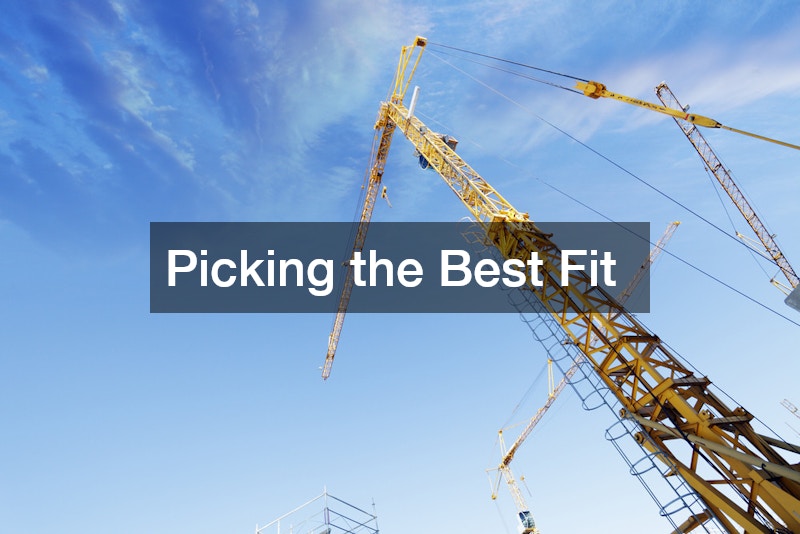When managing a construction business, the right equipment can significantly impact timelines, costs, and safety. Among the most critical assets on any job site are heavy duty cranes, machines designed to handle the toughest lifting challenges. But with so many models, features, and support services available, understanding how to choose, operate, and maintain these machines can be overwhelming. This expert guide is crafted to help business owners and project managers make informed decisions surrounding crane use on their construction sites.
From selecting the right provider to understanding modern crane features, you’ll find practical insights to navigate the many options out there. Whether you’re planning a short-term project or building long-term infrastructure, it’s important to equip your team with dependable machines and equally dependable support. That includes understanding how to maintain and repair your machines and knowing where to find the most reliable services in your region.
This guide walks you through ten essential considerations for incorporating lifting equipment into your operations. By the end of this article, you’ll be better equipped to navigate the complexities of lifting equipment with confidence and clarity. Let’s get started on your expert journey into understanding how to use and manage cranes for your construction success.
1. Picking the Best Fit

Selecting the right crane for your construction business starts with understanding your specific project needs. Every construction site is different, and the type of lifting you’ll be doing depends on factors like load weight, height, space constraints, and job duration. With so many choices on the market, from mobile cranes to tower cranes and more specialized options, it’s important to start by defining what you need to accomplish on-site.
Once your needs are outlined, the next step is evaluating providers who can deliver the right equipment and expertise. A reliable crane company will offer a wide range of crane models along with consulting to help you match the machine to your project demands. Choosing a provider who understands the construction industry inside and out ensures you’re getting more than just a piece of equipment; you’re gaining a strategic partner.
When you work with a company that specializes in heavy duty cranes, you also gain access to deep industry knowledge and long-term reliability. This is crucial when you’re working on large-scale infrastructure or development projects that may span months or even years. An experienced provider can anticipate challenges before they arise and suggest solutions that keep your timeline intact. Investing in the right partnership early on saves time, money, and stress throughout the lifecycle of the build.
2. Gear That Lifts Loads
Lifting isn’t just about brute force; it’s a precision task that requires the right supporting components. Without the proper attachments and accessories, even the most powerful crane won’t be able to perform safely or effectively. That’s where rigging tools play a major role. These pieces of equipment ensure loads are secure, balanced, and lifted in a way that protects both the material and the crew. Understanding how this gear works alongside your crane is crucial for smooth operation.
For crews managing heavy materials daily, reliable lifting rigging equipment is not optional. It’s essential. Each item is rated for specific load limits and must be compatible with both the crane and the materials being moved. Selecting high-quality rigging gear, inspecting it regularly, and ensuring staff are trained in proper use helps minimize downtime and avoid costly accidents.
When dealing with heavy duty cranes, every detail matters, from the hoisting cables to the rigging that holds the load in place. Skimping on accessories or reusing damaged gear can lead to dangerous scenarios that affect productivity and safety. Take the time to build a comprehensive lifting plan that includes appropriate rigging gear, and you’ll find your cranes operate more efficiently, with less wear and tear over time.
3. Smart Lease Choices

Owning a crane can be a large and sometimes unnecessary investment, especially for smaller firms or short-term projects. Renting equipment allows businesses to scale up quickly without committing to the costs of purchase, maintenance, or long-term storage. It’s also an ideal way to test different models and configurations before deciding to invest in one permanently. By exploring rental options, construction companies can stay agile and better match their equipment to their evolving project needs.
A smart crane rental strategy involves more than just picking up the phone and requesting equipment. It includes planning for availability, understanding rental terms, and assessing the age and condition of the crane being supplied. The right rental arrangement can give you access to advanced models of heavy duty cranes that might otherwise be out of reach financially, helping you complete jobs faster and with greater confidence.
Renting gives businesses the ability to reduce liability and administrative overhead. When maintenance and repairs fall under the provider’s responsibility, you’re free to focus on your project without worrying about unexpected breakdowns or service delays. With careful planning and trusted rental partners, leasing becomes a smart financial and logistical solution.
4. Fix It Right the First
Downtime on a job site is more than just an inconvenience—it’s a cost. When a crane malfunctions, the entire operation can stall, putting your schedule, budget, and workforce at risk. Preventive maintenance can reduce the risk of failure, but sometimes breakdowns are unavoidable. That’s why having access to fast and reliable repair services is critical. Keeping heavy duty cranes in working order starts with a strong repair plan that emphasizes quality, speed, and safety.
Partnering with a dependable crane repair company gives you peace of mind. These professionals understand the urgency of on-site equipment failures and are equipped to diagnose and fix problems efficiently. With highly specialized knowledge, they can detect the root cause of issues that others might miss, which prevents repeat problems and keeps your team moving.
For construction businesses that rely on heavy duty cranes for daily tasks, this kind of expert support is non-negotiable. A quality repair provider also offers inspection services to catch small issues before they become large ones. Regular servicing from a trusted company extends the life of your equipment and ensures compliance with safety regulations.
5. Full Support Matters

Having the right crane on-site is important, but so is the full range of support that comes with it. Whether you’re lifting modular units onto a high-rise or setting steel beams into place, your team needs guidance, equipment coordination, and technical expertise. That’s where full-service support comes in. These professionals help with everything from permitting and logistics to equipment setup and certified operators, making your use of cranes safer and more efficient.
Crane services include a variety of offerings, such as equipment transportation, site analysis, technical consultations, and even emergency dispatch. Companies offering full-service packages can scale with your job requirements, whether you need assistance for a few hours or several weeks. They help reduce project complexity by offering a single point of contact for everything crane-related, keeping your workflows organized and on track.
When a team is backed by dependable crane services, it translates to better performance across the board. It eliminates guesswork, reduces liability, and ensures your team has everything it needs to operate successfully. Whether you’re managing a one-off build or overseeing a series of projects, having a reliable service partner can be the difference between job site stress and streamlined progress with your heavy duty cranes.
6. Fast Setup Options
Some job sites require lifting solutions that are compact, efficient, and quick to deploy. For projects in tight urban areas or small construction zones, a self erecting crane can offer a smart alternative to traditional tower cranes. These machines can be transported easily and assembled without the need for additional lifting equipment, saving time and labor costs.
What makes a self erecting crane particularly valuable is its user-friendly design. It comes with a hydraulic system that allows for automatic setup, minimizing the manpower and time required to get it up and running. These cranes also offer remote controls, programmable settings, and rotating jibs, making them ideal for jobs that require precision without complexity.
While they may not replace larger, heavy duty cranes for high-rise or long-span applications, self erecting options provide a flexible and powerful tool in the right scenarios. If your projects require frequent crane movement or fast mobilization, integrating one of these cranes into your fleet can lead to improved productivity and reduced costs over time.
7. Neighborhood Know-How

When it comes to construction, local knowledge matters just as much as technical ability. Working with a local crane service means you’re tapping into providers who understand the regional landscape—weather patterns, municipal regulations, road conditions, and more. This familiarity helps avoid common delays and ensures smoother coordination with other local subcontractors and suppliers. In fast-paced projects, having a service team nearby means problems can be solved swiftly with minimal disruption.
A local crane service often has deep roots in the community and a vested interest in maintaining a strong reputation. This typically translates to quicker response times, more flexible scheduling, and greater accountability. They’re also more likely to have experience working on similar builds in the area and may already have the permits or relationships needed to streamline job approval.
Choosing a nearby provider helps build long-term business relationships that grow alongside your construction goals. Whether you need on-call support, last-minute assistance, or simply a reliable partner who can visit the site frequently, a local team brings a level of accessibility and dedication that national or remote services may not provide. When your crane needs are critical and time-sensitive, that local edge makes a difference.
8. Rent Nearby, Save Big
If you’re managing multiple job sites or need access to different crane models, renting locally can be a game-changer. A local crane rental company offers proximity, faster service, and often more competitive pricing because there are fewer transportation and logistics costs. These companies are equipped to deliver cranes quickly and respond rapidly to changing project needs.
Another benefit of renting from a local crane rental company is the flexibility in rental terms and fleet variety. These providers often have cranes tailored to regional building styles and job types, including the heavy duty cranes your business may need. They can offer informed suggestions on which models work best under certain conditions, helping you make more confident and cost-effective choices.
Additionally, local rentals often include on-site support and rapid replacements in case of breakdowns. This adds a valuable layer of reassurance and helps avoid delays that can cost your project valuable time and money. When speed, reliability, and tailored advice are top priorities, going local isn’t just convenient—it’s smart business.
9. Access More Tools
Crane work rarely exists in a vacuum. You often need accompanying equipment—forklifts, generators, concrete mixers, and more—to complete a project smoothly. That’s why using a provider who also offers local equipment rentals can help streamline operations. With everything available from a single source, logistics become simpler, invoicing is more efficient, and job site coordination improves.
Choosing a rental partner that supplies both heavy duty cranes and auxiliary tools means fewer vendors to manage and a stronger support network in case anything goes wrong. This approach reduces downtime and ensures equipment compatibility across all stages of your project. It also provides a single point of accountability, which can help with service coordination and problem-solving.
For growing businesses, especially, access to a wide inventory without heavy investment makes a major difference. With local equipment rentals, you can scale up quickly when big opportunities arise or adjust easily during slower periods. It’s a flexible way to remain competitive while focusing your capital on other growth areas, without sacrificing the capabilities needed to get the job done right.
10. Keep Machines Moving
Any construction operation depends on working machines, and even the most robust equipment needs attention. Heavy equipment repairs are critical to keeping cranes and other essential tools running at peak performance. When a breakdown happens, your project timeline, team morale, and budget are all at risk. Staying on top of maintenance is one of the most cost-effective ways to safeguard productivity.
Timely and professional repair services for cranes minimize downtime and prolong the lifespan of your equipment. Whether it’s an engine issue, hydraulic failure, or electrical problem, experienced technicians can quickly identify and address the problem. Working with a repair team that specializes in crane systems ensures that no detail is overlooked and that safety remains a top priority.
Incorporating regular maintenance into your project planning saves money long-term and prevents last-minute surprises. When your repair team is familiar with your machinery and project style, they can anticipate issues before they escalate. This proactive mindset allows your heavy duty cranes to operate at full capacity, reducing risk and helping you meet your deadlines with confidence.
Build Better with the Right Crane Strategy
Navigating the world of cranes for your construction business may seem overwhelming at first, but the right information and partnerships make all the difference. This expert guide has taken you through the essential steps in understanding, selecting, maintaining, and leveraging crane resources that work for your specific project needs. From choosing the proper equipment to sourcing professional support and repair services, each decision plays a critical role in your project’s success.
As you grow your business and take on more challenging builds, heavy duty cranes will likely become an even more integral part of your operations. By making informed choices and working with experts who understand your unique demands, you gain more than just machinery—you build long-term capability. This guide has equipped you with a roadmap to manage those needs smartly, confidently, and with a strategic edge.
Your success depends not only on the strength of your crew and the scope of your projects but also on the systems and partners you trust. When heavy lifting becomes part of your daily operations, investing in smart crane strategies pays off in durability, safety, and performance. With this guide, you’re now prepared to choose the right path forward in working with heavy duty cranes and advancing your construction business to the next level.


